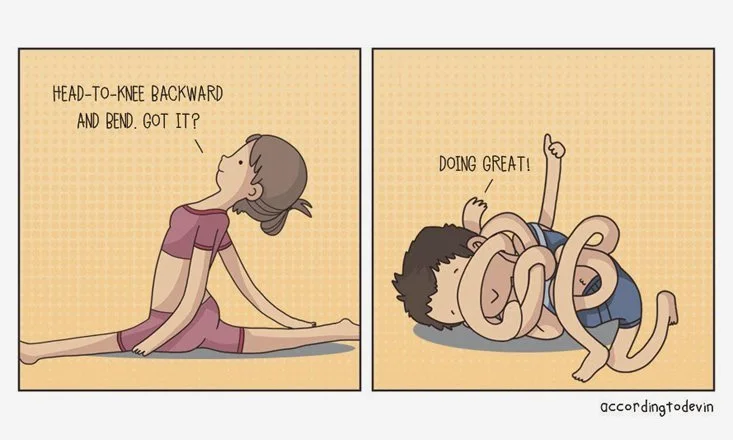There is joy in the clumsily self conscious early stages of being a beginner
Image courtesy: https://www.doyou.com/
This post has been inspired by Tom Vanderbilt’s book ‘Beginners' - The Curious Power of Lifelong Learning’
A month or so ago, I got dragged into attending a Yoga class in a nearby community centre. It was a bit of a disaster where I think I set a new level. A level zero in which I plunged the class average to a very different low! My poor 8th grade bio knowledge was reconfirmed when the instructor used words like sacrum and lumbar. I had to look around confusedly for help to figure out where in the world these parts existed in my body. I awkwardly used some of the props upside down, losing balance many times. By confusing right with left, I ended up in poses that were different and opposite to everyone else. And let's not even get into what happened when I had to touch my hands to my toes!
The last time I did Yoga was in boarding school. I was terrible then, and it seemed nothing much had changed. Yet after a catalog of errors and making a complete fool of myself in those 90 mins, I felt really good about myself!
More than looking to make myself more marketable to employers, I wanted to make myself more marketable to me. In trying to bolster my “life resume”, I was, in some ways, trying to reach back into the past, to try to learn things that had eluded me. I was freed from the worries of “impostor syndrome” - that anxiety of not being the expert I was cracked up to be - because no one actually expected me to be any good. I was liberated from expectation, from the weight of the past. The heaviness of being right and successful was replaced by the lightness of being a beginner again.
We live in an age of high performance, in which everyone is supposed to be constantly maximizing their potential, living their “best life”. Everything must be for something. What is admired is success, achievement, the quality of performance, rather than the quality of the experience. The idea of undertaking new pursuits, ones that you may never be very good at, seems perverse in this age of peak performance. We overvalue performance and undervalue the self. We’re afraid of being just OK at things!
Yet, for all the bumps and bruises, the gaffes and blunders, being a beginner can be a wonderful thing, and that there is magic to the early stages.
In the beginnings of a love affair, we are in what has been called an “extreme neurobiological state”: The brain is jacked on a supersized hyper-caffeinated energy drink of dopamine and stress hormones (the good kind). Our language often reverts to a fragile, childlike babble, as if we were born anew. Learning a new skill is curiously similar. Your brain is in a state of hyperawareness, bathing in novelty. As you plunge into learning some art or skill, the world around you appears new and bursting with infinite horizons. Each day brims with new discoveries as you take your tentative first steps, slowly pushing the bounds of exploration. You make mistakes, but even those are empowering, because they are mistakes you have never made before. As you learn new things, you will learn new things about yourself. You seem to make progress by leaps and bounds. The novelist Norman Rush described love as like entering a series of new rooms, and each time, even though you’ve done this sort of thing before, you’re surprised. You never intend to go from one room onward to the next - it just happens. You notice a room, you go through, and you’re delighted again. That’s what learning feels like, especially in these early stages. In psychology, this is called openness to experience. This openness entails a “cognitive and behavioral flexibility” that’s useful in addressing the challenges of later life.
In that yoga class, it didn't matter if I was good or not; I simply wanted to embrace the experience. I just wanted to enter a new room with people who were like minded in their desire to learn new things. There was a sense of self expansion (literally!) and a feeling of growth, that sense that I had just become someone new, which I couldn’t help excitedly telling people about.
To permit yourself to do only that which you are good at, is to be trapped in a cage whose bars are not steel but self judgment. By taking on new pursuits as a beginner, you will be able to think again, like children: freed from preconceptions, unburdened by expectation, less categorical in your outlook. You will be able to push beyond your domains, beyond yourselves. And you will have fun - never to be underestimated as an agent of learning and discovery.
As I embark on a new year to try and get my hands to reach closer to my toes (!!), I encourage you to preserve and cultivate that spirit of the novice: the naive optimism, the hypervigilant alertness that comes with novelty and insecurity, the willingness to look foolish, and the permission to ask obvious questions - the unencumbered beginner’s mind. It’s these small acts of reinvention, at any age, that can make life seem magical!


